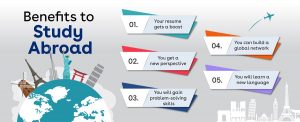
Study Abroad Guide for Parents
Are you a parent considering sending your child abroad to study? If so, you’ve come to the right place. Our comprehensive study abroad guide for parents is designed to provide you with all the information you need to navigate this exciting journey alongside your child. From selecting the right destination and choosing a suitable program to understanding the financial aspects and ensuring their safety, we’ve got you covered.
As a trusted resource in the education industry, we understand the concerns and questions parents may have when it comes to their child studying abroad. That’s why we’ve compiled this guide to address all your queries and help you make informed decisions.
With our practical tips and insights, you’ll gain a deeper understanding of the benefits of studying abroad, the application process, scholarships and funding options, and how to support your child throughout their international education experience.
The Importance of Studying Abroad for Students
Studying abroad offers numerous benefits for students that extend beyond the classroom. It provides them with the opportunity to immerse themselves in a different culture, gain global perspectives, and develop essential skills that will benefit them throughout their lives. By experiencing different educational systems and engaging with diverse communities, students can broaden their horizons and become more adaptable and resilient individuals.
It’s important to note that studying abroad isn’t just for students pursuing degrees in international studies or languages. There are study abroad programs available in a wide range of fields, allowing students to gain valuable insights and experiences specific to their chosen disciplines. Whether your child is interested in business, science, arts, or any other subject, there are study abroad options catered to their interests.
Also Read Us: 5 Emerging Study Abroad Destinations Every Indian Student Must Know
Common Concerns and Misconceptions about Studying Abroad
As a parent, it’s natural to have concerns about your child studying abroad. However, it’s important to address these concerns and dispel any misconceptions that may hinder your child’s study abroad journey. One common concern is the safety of students while they are abroad. While safety is a valid concern, it’s essential to gather accurate information about the destination and the steps taken by the study abroad program to ensure the well-being of students.
Additionally, some parents worry that studying abroad may delay their child’s graduation or disrupt their academic progress. However, many study abroad programs are designed to seamlessly integrate with a student’s academic plan, ensuring that they stay on track to complete their degree. It’s crucial to work closely with academic advisors to ensure a smooth transition and maximize the benefits of studying abroad.
Benefits of Studying Abroad for Students
Studying abroad offers a multitude of benefits for students that extend far beyond the academic realm. It provides them with the opportunity to develop essential life skills, gain independence, and foster personal growth. By stepping out of their comfort zones and facing new challenges, students become more adaptable, resilient, and culturally aware individuals.
One of the key benefits of studying abroad is the exposure to different cultural perspectives. By living and studying in a foreign country, students have the chance to engage with people from diverse backgrounds, learn about different customs and traditions, and gain a deeper appreciation for global diversity. This cross-cultural experience not only broadens their horizons but also enhances their ability to work effectively in multicultural environments.
Overall, studying abroad equips students with a global mindset, a deeper understanding of the world, and the skills necessary to thrive in an increasingly interconnected and multicultural society.
How Studying Abroad Can Enhance a Student’s Academic and Personal Development
Studying abroad offers a transformative experience that can significantly enhance a student’s academic and personal development. It provides them with the opportunity to step outside their comfort zones, challenge themselves, and grow in ways they never thought possible. Here are some of the ways studying abroad can positively impact a student’s journey:
Academic Excellence: Studying abroad allows students to gain exposure to different teaching styles, educational systems, and academic resources. This exposure can enhance their learning experience and provide them with a fresh perspective on their chosen field of study. Students often return from their study abroad experience with improved critical thinking, problem-solving, and research skills.
Cultural Immersion: Living in a foreign country exposes students to new cultures, traditions, and ways of life. It encourages them to step outside their cultural bubble and embrace diversity. By immersing themselves in a different culture, students gain a deeper understanding and appreciation for global perspectives, which can greatly enrich their academic and personal lives.
Language Acquisition: Studying abroad provides an excellent opportunity for students to learn or improve their language skills. Being immersed in a foreign language environment allows for rapid language acquisition and fluency development. The ability to communicate in multiple languages is not only beneficial academically but also opens up international career opportunities.
Personal Growth: Studying abroad challenges students to become more independent, self-reliant, and adaptable individuals. They learn to navigate unfamiliar environments, manage their finances, and handle day-to-day tasks in a foreign country. This increased self-confidence and resilience gained through studying abroad can benefit students in all areas of their lives.
Global Perspective: Exposure to different cultures and perspectives broadens a student’s worldview and fosters a global mindset. It allows them to see beyond their own cultural biases and understand the interconnectedness of the world. This global perspective is highly valued by employers and can give students a competitive edge in the job market.
By embracing the challenges and opportunities that come with studying abroad, students can unlock their full potential and gain a unique edge in their academic and personal development.
Factors to Consider When Choosing a Study Abroad Program
Choosing the right study abroad program for your child is a crucial decision that can greatly impact their overall experience. It’s essential to consider several factors to ensure that the program aligns with their academic goals, personal interests, and long-term aspirations. Here are some key factors to consider when selecting a study abroad program:
Academic Fit: Consider whether the program offers courses that align with your child’s academic interests and requirements. Look into the reputation and accreditation of the host institution to ensure the academic quality and transferability of credits. Additionally, consider the language of instruction and the level of language proficiency required for the program.
Location: The destination plays a significant role in the study abroad experience. Consider factors such as the cultural and social environment, safety, climate, proximity to attractions, and accessibility to travel within the region. Discuss with your child their preferences, interests, and any specific goals they may have for their study abroad experience.
Program Duration: Study abroad programs vary in length, ranging from a few weeks to a full academic year. Consider the ideal duration based on your child’s academic needs, personal goals, and comfort level with being away from home. Longer programs may provide a more immersive experience, while shorter programs can be a good starting point for those new to studying abroad.
Program Type: There are various types of study abroad programs available, including direct enrollment at a foreign university, exchange programs, faculty-led programs, and internships abroad. Each program type offers unique advantages and considerations. Discuss with your child their preferences and goals to determine the most suitable program type.
Support Services: Consider the level of support provided by the study abroad program. Look into the availability of on-site staff, orientation programs, housing arrangements, health and safety resources, and emergency support services. Adequate support can greatly contribute to your child’s overall well-being and peace of mind while they are abroad.
Cost and Financial Aid: Evaluate the cost of the study abroad program, including tuition, housing, meals, transportation, and other related expenses. Research available scholarships, grants, and funding options to make studying abroad more affordable. It’s important to have a clear understanding of the financial implications and plan accordingly.
Steps to Take to Ensure a Safe and Successful Study Abroad Experience
Ensuring the safety and well-being of your child during their study abroad experience is of utmost importance. By taking proactive measures and staying informed, you can help create a secure and successful study abroad journey for your child. Here are some steps to consider:
Research Destination Safety: Before finalizing a study abroad destination, thoroughly research its safety record. Consult travel advisories, read government websites, and seek advice from reliable sources. Pay attention to any specific safety concerns, local laws, and customs that may impact your child’s experience.
Communication Plan: Establish a communication plan with your child before they leave. Determine the best methods and frequency of communication and set expectations regarding regular check-ins. Ensure that both you and your child have access to reliable communication channels, such as international calling or messaging apps.
Travel and Health Insurance: Ensure that your child has comprehensive travel and health insurance coverage for the duration of their study abroad program. Familiarize yourself with the coverage details and emergency procedures. Keep copies of the insurance documents easily accessible.
Emergency Contacts: Compile a list of emergency contacts for your child, including local program coordinators, host institution contacts, embassy or consulate details, and trusted individuals in the host country. Share this information with your child and keep a copy for yourself.
Health and Medication: Ensure your child has received any necessary vaccinations or medical preparations recommended for the study abroad destination. Discuss any specific health concerns with their healthcare provider. Encourage your child to carry a supply of any prescribed medications, along with necessary prescriptions.
Resources and Support Available for Parents of Students Studying Abroad
Education Abroad Offices: Most universities and colleges have dedicated education abroad offices that provide comprehensive information and support for parents. These offices can guide you through the study abroad process, provide advice on program selection, and address any concerns or questions you may have.
Parent-Specific Webinars and Workshops: Many study abroad organizations and education institutions offer webinars, workshops, and information sessions specifically designed for parents. These sessions cover topics such as health and safety, financial planning, and communication strategies. Participating in these sessions can help you gain valuable insights and connect with other parents.
Online Communities and Forums: Joining online communities and forums for parents of students studying abroad can provide a supportive network and a platform to share experiences, ask questions, and seek advice. These communities often include parents who have gone through the study abroad process and can offer valuable firsthand insights.
Travel Insurance Providers: Travel insurance providers often offer resources and support specifically tailored to parents of students studying abroad. They can provide guidance on insurance coverage, emergency procedures, and general safety tips. Familiarize yourself with the resources available through your insurance provider.
Government Websites and Travel Advisories: Government websites, such as those from the U.S. Department of State or the Foreign and Commonwealth Office, provide travel advisories, safety information, and resources for citizens traveling or studying abroad. These websites offer valuable insights into country-specific risks and precautions.
Social Media Groups: Explore social media platforms for study abroad-related groups and communities. These groups often include parents who have firsthand experience with the study abroad process and can provide guidance and support. It’s important to verify the credibility of the information shared in these groups and consult official sources for accurate and up-to-date information.
Remember, you are not alone in this journey. Utilize the resources available to you, seek support from other parents, and stay informed to ensure the best possible study abroad experience for your child.
Get assistance to study abroad from our international education experts at Gateway International and get free consultancy for study abroad who can help guide you throughout your study abroad journey.
For the Premium services your journey to success starts here.



